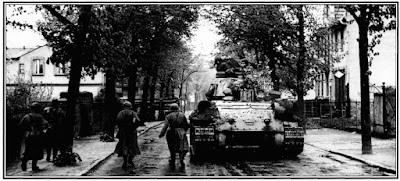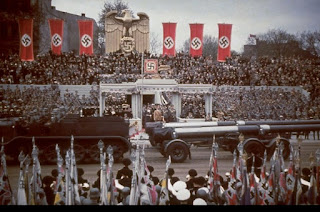V-MAIL
438th AAA AW BN
APO 230 % Postmaster, N.Y.
22 April, 1945
Brussels
Dearest darling Wilma –
After being here for two days – we find that this hotel is reserved for War Correspondents – mostly British. I don’t know how we stumbled upon it – but we gave them a song and dance when we arrived – and they’ve treated us very well. The fact is – everyone is very respectful to the Americans who come from a combat area and when they learned we had driven all the way from Halle – they couldn’t do enough for us.
We’ve been here almost 3 days now and hardly done a thing except visit cafés and sip beer. It has been quite cloudy most of the time and I haven’t been able to take any snaps – but I’ll get some before I go. But it is away from the every day Army life and that’s something. The fact is – Sweetheart – that I think I’m really going to enjoy being a civilian again – and with you with me always – I’m sure I’ll know what heaven on earth is really like. Gosh, darling, I can hardly wait to see you and hold you and realize that we are together again. It must come soon – I hope! All for now, dearest; love to the folks – and
After being here for two days – we find that this hotel is reserved for War Correspondents – mostly British. I don’t know how we stumbled upon it – but we gave them a song and dance when we arrived – and they’ve treated us very well. The fact is – everyone is very respectful to the Americans who come from a combat area and when they learned we had driven all the way from Halle – they couldn’t do enough for us.
We’ve been here almost 3 days now and hardly done a thing except visit cafés and sip beer. It has been quite cloudy most of the time and I haven’t been able to take any snaps – but I’ll get some before I go. But it is away from the every day Army life and that’s something. The fact is – Sweetheart – that I think I’m really going to enjoy being a civilian again – and with you with me always – I’m sure I’ll know what heaven on earth is really like. Gosh, darling, I can hardly wait to see you and hold you and realize that we are together again. It must come soon – I hope! All for now, dearest; love to the folks – and
My everlasting love
Greg
* TIDBIT *
about Walter Winchell

Walter Winchell
(April 7, 1897 – February 20, 1972)
about Walter Winchell

Walter Winchell
(April 7, 1897 – February 20, 1972)
The following short biography has been excerpted from Wikipedia:
Born Walter Weinschel in New York City, he left school in the sixth grade and started performing in a vaudeville troupe known as Gus Edwards' "Newsboys Sextet."
His career in journalism was begun by posting notes about his acting troupe on backstage bulletin boards. Joining the Vaudeville News in 1920, Winchell left the paper for the Evening Graphic in 1924, and in turn was hired on June 10, 1929 by the New York Daily Mirror where he finally became the author of what would be the first syndicated gossip column, entitled On-Broadway. He wrote in a style filled with slang and incomplete sentences.
Using connections in the entertainment, social, and governmental realms, he would expose exciting or embarrassing information about celebrities in those industries. This caused him to become very feared, as a journalist, because he would routinely impact the lives of famous or powerful people, exposing alleged information and rumors about them, using this as ammunition to attack his enemies, and to blackmail influential people. He used this power, trading positive mention in his column (and later, his radio show) for more rumors and secrets.
He made his radio debut over WABC in New York, a CBS affiliate, on 12 May 1930. In 1932, his coverage of the Lindbergh kidnapping and subsequent trial received national attention. His newspaper column was syndicated in over 2,000 newspapers worldwide, and he was read by 50 million people a day from the 1920s until the early 1960s. His Sunday night radio broadcast was heard by another 20 million people from 1930 to the late 1950s.
Winchell, who was Jewish, was one of the first commentators in America to attack Adolf Hitler and American pro-fascist and pro-Nazi organizations such as the German-American Bund. He was a staunch supporter of President Franklin D. Roosevelt and the New Deal throughout the Depression era, and frequently served as the Roosevelt Administration's mouthpiece in favor of interventionism as the European war crisis loomed in the late 1930s. Early on he denounced American isolationists as favoring appeasement of Hitler.
Throughout the 1930s and 1940s, Winchell was also an outspoken supporter of civil rights for African-Americans, and frequently attacked the Ku Klux Klan and other racist groups as supporting un-American, pro-Nazi goals. After World War II, Winchell began to denounce Communism as the main threat facing America.
In 1948 Winchell had the top rated radio show when he surpassed Fred Allen and Jack Benny. During the 1950s Winchell favored Senator Joseph McCarthy, but he became unpopular as the public turned against McCarthy. He also had a weekly radio broadcast which was simulcast on ABC television until he ended that employment because of a dispute with ABC executives in 1955. A dispute with Jack Paar effectively ended Winchell's career, signaling a shift in power from print to television.
During this time, NBC had given him the opportunity to host a variety show, which lasted only thirteen weeks. His readership gradually dropped, and when his home paper, the New York Daily Mirror, where he'd worked for thirty-four years, closed in 1963, he faded from the public eye. He did, however, receive $25,000 per episode to narrate The Untouchables on the ABC television network for five seasons beginning in 1959.
Winchell opened his radio broadcasts by pressing randomly on a telegraph key, a sound which created a sense of urgency and importance and the catchphrase "Good evening Mr. and Mrs. America from border to border and coast to coast and all the ships at sea. Let's go to press." He would then read each of his stories with a staccato delivery (up to a rate of 197 words per minute).
His career in journalism was begun by posting notes about his acting troupe on backstage bulletin boards. Joining the Vaudeville News in 1920, Winchell left the paper for the Evening Graphic in 1924, and in turn was hired on June 10, 1929 by the New York Daily Mirror where he finally became the author of what would be the first syndicated gossip column, entitled On-Broadway. He wrote in a style filled with slang and incomplete sentences.
Using connections in the entertainment, social, and governmental realms, he would expose exciting or embarrassing information about celebrities in those industries. This caused him to become very feared, as a journalist, because he would routinely impact the lives of famous or powerful people, exposing alleged information and rumors about them, using this as ammunition to attack his enemies, and to blackmail influential people. He used this power, trading positive mention in his column (and later, his radio show) for more rumors and secrets.
He made his radio debut over WABC in New York, a CBS affiliate, on 12 May 1930. In 1932, his coverage of the Lindbergh kidnapping and subsequent trial received national attention. His newspaper column was syndicated in over 2,000 newspapers worldwide, and he was read by 50 million people a day from the 1920s until the early 1960s. His Sunday night radio broadcast was heard by another 20 million people from 1930 to the late 1950s.
Winchell, who was Jewish, was one of the first commentators in America to attack Adolf Hitler and American pro-fascist and pro-Nazi organizations such as the German-American Bund. He was a staunch supporter of President Franklin D. Roosevelt and the New Deal throughout the Depression era, and frequently served as the Roosevelt Administration's mouthpiece in favor of interventionism as the European war crisis loomed in the late 1930s. Early on he denounced American isolationists as favoring appeasement of Hitler.
Throughout the 1930s and 1940s, Winchell was also an outspoken supporter of civil rights for African-Americans, and frequently attacked the Ku Klux Klan and other racist groups as supporting un-American, pro-Nazi goals. After World War II, Winchell began to denounce Communism as the main threat facing America.
In 1948 Winchell had the top rated radio show when he surpassed Fred Allen and Jack Benny. During the 1950s Winchell favored Senator Joseph McCarthy, but he became unpopular as the public turned against McCarthy. He also had a weekly radio broadcast which was simulcast on ABC television until he ended that employment because of a dispute with ABC executives in 1955. A dispute with Jack Paar effectively ended Winchell's career, signaling a shift in power from print to television.
During this time, NBC had given him the opportunity to host a variety show, which lasted only thirteen weeks. His readership gradually dropped, and when his home paper, the New York Daily Mirror, where he'd worked for thirty-four years, closed in 1963, he faded from the public eye. He did, however, receive $25,000 per episode to narrate The Untouchables on the ABC television network for five seasons beginning in 1959.
Winchell opened his radio broadcasts by pressing randomly on a telegraph key, a sound which created a sense of urgency and importance and the catchphrase "Good evening Mr. and Mrs. America from border to border and coast to coast and all the ships at sea. Let's go to press." He would then read each of his stories with a staccato delivery (up to a rate of 197 words per minute).
Here is Walter Winchell's news report for 22 April 1945
And here are some of his quotes:
And here are some of his quotes:
A pessimist is one who builds dungeons in the air.
An optimist is someone who gets treed by a lion but enjoys the scenery.
I usually get my stuff from people who promised somebody else that they would keep it a secret.
Gossip is the art of saying nothing in a way that leaves practically nothing unsaid.
Today's gossip is tomorrow's headline.
A real friend is one who walks in when the rest of the world walks out.
I never lost a friend I wanted to keep.
Remember that nobody will ever get ahead of you as long as he is kicking you in the seat of the pants.
The same thing happened today that happened yesterday, only to different people.
She's been on more laps than a napkin.
An optimist is someone who gets treed by a lion but enjoys the scenery.
I usually get my stuff from people who promised somebody else that they would keep it a secret.
Gossip is the art of saying nothing in a way that leaves practically nothing unsaid.
Today's gossip is tomorrow's headline.
A real friend is one who walks in when the rest of the world walks out.
I never lost a friend I wanted to keep.
Remember that nobody will ever get ahead of you as long as he is kicking you in the seat of the pants.
The same thing happened today that happened yesterday, only to different people.
She's been on more laps than a napkin.
























